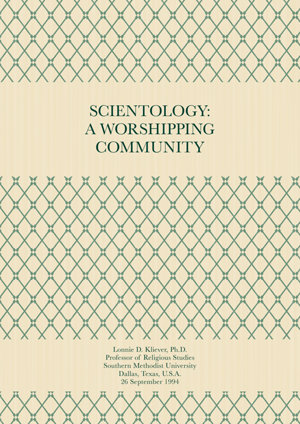ABOUT THE EXPERTISE
In this article, Professor Lonnie D. Kliever examines and answers two questions: (1) Is Scientology a religion, and (2) Are Scientology Churches places of worship? “I am convinced by reason of my professional training and scholarly research,” Dr. Kliever concludes, “that Scientology is a religious organization in all respects of that term because it meets the scholarly definition of any religious tradition, because it pursues the goals of any religious quest, and because it exhibits the dimensions of any religious community. I am also convinced that Scientology is a worshipping community in every sense of the word because its object of worship is both absolute and transcendent, its forms of worship are both spiritual and educational, and its occasions of worship are both private and public.” Churches of Scientology offer a variety of services and are open to the public in over 167 nations.
BIOGRAPHY
Lonnie D. Kliever, Ph.D., (1932–2004) served as professor of religious studies and department chair at Southern Methodist University in Dallas, Texas. He received a bachelor of arts (magna cum laude) in psychology from Hardin-Simmons University (1955), master of divinity (cum laude) from Union Theological Seminary of New York (1959), and the doctor of philosophy in religion and philosophy from Duke University (1963). Dr. Kliever also held faculty appointments in the Department of Philosophy at the University of Texas at El Paso (1962–65), the Department of Religion at Trinity University of San Antonio (1965–69), and the Department of Religious Studies at the University of Windsor, Ontario, Canada (1969–75). He authored dozens of articles and numerous books on philosophy and religious studies, including Radical Christianity: The New Theologies in Perspective (1968); Shattered Spectrum: A Survey of Contemporary Theology (1981); The Terrible Meek: Religion and Revolution in Cross Cultural Perspective (1987); Dax’s Case: Essays in Medical Ethics and Human Meaning (1989); and H. Richard Niebuhr (1991). Dr. Kliever was a longtime member of the American Association of University Professors, American Academy of Religion, Society for the Scientific Study of Religion, American Theological Society, Canadian Society for the Study of Religion, Canadian Theological Society, and Council on the Study of Religion.

Scientology, Social Science and the Definition of Religion
by James A. Beckford, Professor of Sociology, University of Warwick, England

Social Change and New Religious Movements
by Bryan R. Wilson,
Emeritus Fellow in Sociology, Oxford University

The Church of Scientology
by Juha Pentikäinen, Marja Pentikäinen, University of Helsinki, Finland

The Relationship Between Scientology and Other Religions
by Fumio Sawada, Eighth holder of the secrets of Yu-itsu Shinto, the oldest religion in Japan; President, Ahlul-Bait Center

The Religious Nature of Scientology
by Geoffrey Parrinder, Methodist minister, Professor, Comparative Study of Religions, University of London

Religious Philosophy, Religion and Church
by G.C. Oosthuizen, Professor of Science of Religion, University of Durban-Westville, Natal, South Africa

Scientology a New Religion
by M. Darrol Bryant, Department of Religious Studies, Renison College, University of Waterloo, Ontario, Canada

Apostates and New Religious Movements
by Bryan R. Wilson,
Emeritus Fellow in Sociology, Oxford University

Scientology: An Analysis and Comparison of its Religious Systems and Doctrines
by Bryan R. Wilson,
Emeritus Fellow in Sociology, Oxford University

The Reliability of Apostate Testimony About New Religious Movements
by Lonnie D. Kliever Ph.D., Professor of Religious Studies

The Sea Organization and its Role Within the Church of Scientology
by Frank K. Flinn Ph.D. Adjunct Professor in Religious Studies

Brief Analyses of the Religious Nature of Scientology
by J. Gordon Melton, Baylor University, Samuel Hill, Gary Bouma, Irving Hexham

Congregational Services of the Church of Scientology
by Bryan R. Wilson,
Emeritus Fellow in Sociology, Oxford University

Is Scientology A Religion?
by Alan W. Black, Associate Professor of Sociology, University of New England, Armidale, New South Wales, Australia

Is Scientology a Religion?
by Dean M. Kelley, National Council of Churches

Religious Toleration & Religious Diversity
by Bryan R. Wilson,
Emeritus Fellow in Sociology, Oxford University

Scientology A Religion In South Africa
by David Chidester, Professor of Comparative Religion, University of Cape Town, South Africa

Scientology: A True Religion
by Urbano Alonso Galan, Professor of Philosophy and Theology, Gregorian University of Rome

Scientology: A Way of Spiritual Self-Identification
by Michael Sivertsev, Moscow Academy of Sciences

Scientology: A Worshipping Community
by Lonnie D. Kliever, Southern Methodist University, Dallas, Texas

Scientology and Contemporary Definitions of Religion in the Social Sciences
by Alejandro Frigerio, Professor of Sociology, Catholic University of Argentina, Buenos Aires

Scientology and Islam an Analogous Study
by Fumio Sawada, Eighth holder of the secrets of Yu-itsu Shinto, the oldest religion in Japan; President, Ahlul-Bait Center

Scientology and Religion
by Christiaan Vonck, Rector, Faculty for Comparative Study of Religion, Antwerp, Belgium

Scientology: A Comparison with Religions of the East and West
by Per-Arne Berglie, Professor of History of Religion, University of Stockholm

Scientology Its Cosmology, Anthropology, System of Ethics and Methodologies
by Régis Dericquebourg, Professor of Sociology of Religion, University of Lille III, France

Scientology – Its Historical-Morphological Frame
by Dario Sabbatucci, Professor of History of Religions, University of Rome

Scientology: Its True Nature
by Harri Heino, Professor of Theology, University of Tampere, Finland

Scientology: The Marks of Religion
by Frank K. Flinn, Adjunct Professor of Religious Studies Washington University
